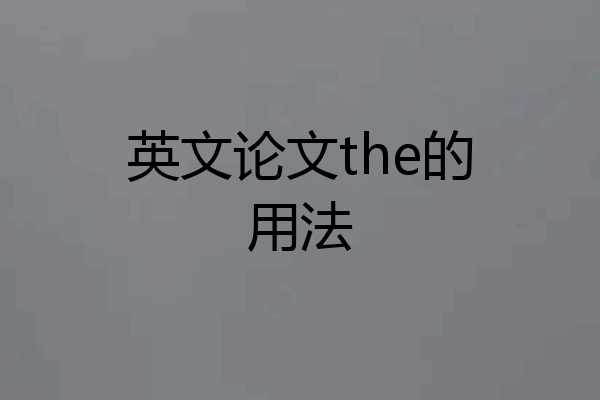 梁小姐12
梁小姐12
共2条回答88浏览
-
 夢女孩儿2小时前发布
夢女孩儿2小时前发布-

英语作文中the的用法
英语作文中the的用法很多人在写作文的时候都会遇到一个相同的问题:冠词究竟应该怎么用?接下来是我给大家整理有关英语作文中the的用法资料,欢迎阅读!
1.Who was the first American in the space?
2.The books fill leisure time for many people.
3.The history shows that the usual response to violent protest is repression.
4.Homelessness is a serious problem for the society.
上面这四个句子的冠词使用全都是错误的(原因在下面有分析),这些错误有时候很难凭语感来判断。因此,我们需要系统地学习关于冠词使用的语法知识。
从语法上讲,冠词是虚词的一种,它只能搭配名词使用,说明该名词的意义。英语中的冠词可以分为:定冠词(the),不定冠词(a或者an)和零冠词。对于冠词使用,最核心的地方有两点:
1.判断和冠词搭配使用的名词是可数名词还是不可数名词
2.判断冠词在语境中是特指还是泛指
先说第一点,关于可数名词和不可数名词的判断。汉语中并没有可数名词和不可数名词的概念,这给我们判断单词是否可数带来了很大困难。比如“家具”(furniture),这个概念在汉语中是可数的,但在英语中它不可数。又比如“发展”(development),按照汉语思维习惯,它应该是不可数名词,但它实际上可以作为可数名词使用(例如:There have been significant computer developments during the last decade.)
要判断一个单词是否可数不能靠直觉,只能多查词典,参考词典的解释和例句。词典查多了我们对常用词的单复数判断会越来越准确。
第二点是区分冠词的特指和泛指。泛指是指一类事物,或某类事物的总称。特指是指某类事物中的具体的某一个或某一些。举个例子:
Pumas are large, cat-like animals which are found in America. When reports came into London Zoo that a wild puma had been spotted forty-five miles south of London, they were not taken seriously. However, as the evidence began to accumulate, experts from the Zoo felt obliged to investigate, for the descriptions given by people who claimed to have seen the puma were extraordinarily similar.
句子开头的 Pumas 泛指美洲狮这种动物,最后一句中 the puma 是特指,指代那只从动物园逃遁的美洲狮。
对于冠词的泛指,有四种表达形式:
1.不可数名词不加冠词表示泛指
2.复数名词不加冠词表示泛指
3.单数名词加定冠词 the 可以表示泛指
4.不定冠词 a/an 加单数名词可以表示泛指
下面解释一下这几点:
1.不可数名词不加冠词表示泛指
不可数名词在表示泛指时,前面不加定冠词 the,如果加 the,则表示特指。比如:
Salt is a strong-tasting substance, in the form of white powder or crystals.
此时 salt 是泛指,指代“盐”这一类物品。
Can you pass the salt please?
上面这句话的意思是“请把盐递过来好吗?”,这里 salt 是特指,指说话人和听话人都知道的那一袋“盐”。
文章开头的几个句子:
1.Who was the first American in the space?
2.The history shows that the usual response to violent protest is repression.
3.Homelessness is a serious problem for the society.
第一个句子错误的原因在于,space 表示“太空”时是不可数名词,不可数名词加定冠词 the 就变成了特指,这与句子要表达的意思不相符。原句要强调的是一个泛指的“太空”,因此 space 不能加 the,即要写成:
Who was the first American in space?
第二个句子中 history 是一个不可数名词,而原句要表达的“历史”是一个泛指概念,因此 the 也要去掉,即:
History shows that the usual response to violent protest is repression.
第三个句子也是同样的道理,当表示广义上的“社会”时,society 是不可数名词,单词前面的 the 要去掉(如果 the 不去掉就变成了特指,这与句子的语境不符):
Homelessness is a serious problem for society.
2.复数名词不加冠词表示泛指
复数名词在表示泛指时前面不能加定冠词 the,如果加了 the,就表示特指,比如:
(1)Pumas are large, cat-like animals which are found in America.
(2)The pumas escaped from the zoo.
第一个句子中的 pumas 是泛指,指美洲狮这种动物,第二个句子中 pumas 是特指,指一群逃离动物园的美洲狮。对于上面提到的句子:
The books fill leisure time for many people.
句子要表达的意思是“图书能够帮很多人打发空闲时间”,此时“图书”应该是泛指概念,但句子中 the books 只能表示特指,因此与语境不符。句子应该改成:
Books fill leisure time for many people.
3.单数名词加定冠词 the 可以表示泛指
定冠词 the 与单数名词连用时,可以表示泛指,表示一个由典型的样品所代表的那个类别。
举个例子,要泛指“政府”,应该怎么说? 下面两个外刊标题给出了答案:
1.Why governments should introduce gender budgeting
2.Should the government guarantee work for everybody
这两个标题中 government 都是可数名词,可以通过 governments 或 the government 来泛指“政府”。不少人在写作文时经常出现这样的句子:
To solve this problem, the governments should .
这种写法是错误的,因为 the governments 是特指用法,不能用来泛指政府,应该说:
To solve this problem, governments / the government should .
4.不定冠词 a/an 加单数名词可以表示泛指
不定冠词 a/an 加单数名词可以泛指某一类事物中任何一个具有代表性的.成员。举个例子,柯林斯词典对 puma 一词的定义是这样的:
A puma is a wild animal that is a member of the cat family. Pumas have brownish-grey fur and live in mountain regions of North and South America.
第一个句子 a puma 泛指美洲狮这种动物,第二个句子 pumas 同样也泛指美洲狮这种动物。
不过需要注意的一点是,a/an 加单数名词泛指主要是限于用在主语的情况,在其他位置上不表示泛指。
冠词的特指主要有下面几种情况:
1.the+不可数名词
2.the+可数名词复数
3.the+可数名词单数(需要根据语境判断)
关于第一点和第二点,我们在前面已经有解释过,第三点 the+可数名词单数表示特指要考虑语境因素,比如前面的选段:
When reports came into London Zoo that a wild puma had been spotted forty-five miles south of London, they were not taken seriously. However, as the evidence began to accumulate, experts from the Zoo felt obliged to investigate, for the descriptions given by people who claimed to have seen the puma were extraordinarily similar.
段落中出现了两个 puma,第一个 puma 是不定指,第二个 puma 指代前面提到的那只“美洲狮”,因此是特指。
其他情况
除了上面提到的泛指和特指之外,冠词还有一些特殊用法,比如 “the+形容词”表示一类人,此时是泛指。举个例子:
There is an increasing gap between the rich and the poor.
the rich,the poor 都是“the+形容词”的泛指形式。
关于冠词的其他特殊用法可以参考语法书中对冠词的讲解部分。
扩展资料:
the的中文是什么意思
1、指已提到或易领会到的人或事物。
2、指独一无二的、正常的或不言而喻的人或事物。
3、解说时用。
the
读音:英 [ , i] 美 [ , i]
语法:定冠词the具有确定的意思,用以特指人或事物,表示名词所指的人或事物是同类中的特定的一个,以别于同类中其他的人或事物,相当于中文中的“那个”或“这个”的意思。它可以和单、复数名词,也可以和不可数的名词连用。
the的近义词:a、an
一、a
读音:英 [] 美 []
释义:(用于可数名词或单数名词前,表示未曾提到的)一(人、事、物)。
语法:通常来说,a是用在以辅音开首的词前面。
二、an
读音:英 [n] 美 [n]
释义:(指初次提及或非特指的人或物)一(个),(一类人或事物中非特指的)任何一(个)。
语法:可数名词前面用 a(或an),不可数名词前面不可用a(或an),如可以说 a healthy boy,却不可以说 a health。
-
-
-
英语是中国学者发表英文期刊的最大拦路虎。
我之前文章写过,大部分发在中文EI期刊上的学术文章,其实水平都够发英文SCI,但因为英语不好、语法不地道,往往第一关就被编辑拒掉,连外审的机会都没有。
我的英语同样不尽人意,有一次文章投稿,审稿人密密麻麻提了200多个意见,大部分都是语法错误。
在这些语法错误中,有一类错误,只跟一个单词有关,相信不光是我,其他人也都会犯。
这就是“the”。
这个词真的很烦,什么时候该加,什么时候不该加,头大的很。偏偏the的使用又很微妙,你说它重要吧,用好不会给你加分;说不重要吧,用不好编辑直接拒你。
跟牙疼一样,牙疼不是病,疼起来真要命。
我研读了大量论文,并参考很多语法书,总结‘the’的用法,终于弄明白了。从此,英文论文再也没有因为语言问题被编辑拒过。
我画了一张图,基本涵盖the的所有用法,大家可以参考,应该不会再犯错误。
下面详细介绍。
英文期刊文章的标题力求简练,所以把the省掉。进一步的,a/an也可以省掉。
加the不能说错,毕竟语法正确,但显得啰嗦,最好去掉。
有一类论文比较例外,题目中大都有冠词,那就是综述。一般以‘an overview of …’或‘a review of …’,当然也有不加冠词的,直接‘review of …’,我看了很多文章,加不加冠词应该都可以。
这一条是中国学生撰写论文犯得最多的错误,也是英语水平低下的最显著错误。
所以请牢记,单数可数名词,一定不能单独出现,前面必须加’a/an/the’。至于加‘a/an’还是’the’,需要看其他规则。
这个‘特指’,不太好解释,如果非要辨别的话,我有个不成熟的小法则:
如果翻译成中文,里面暗含‘这个’‘那个’;或者说,如果你把“这”“那”加到名词前面,意思不会出错,那么这种情况需要加‘the’
举个栗子。
‘the cat on the desk’,翻译为“桌子上的猫”,但不嫌啰嗦的话,也可以翻译成‘那张桌子上的那只猫’,意思不会有歧义。因为这里特指某个桌子上的某个猫。而如果用‘a cat on the desk’,应该翻译为“桌上的猫”,不是特指,翻译的时候加“那只”就改变意思了。
’the desk’也一样,指的是某张特定的桌子,‘那个桌子上的猫’,这样翻译没错。而如果桌子没有特指,就不能用‘the’,泛指桌子上的猫。
其实大多数情况下,是不是特指很难确定,尤其是使用名词复数的时候,加不加the语法都对:加the指具体一些东西,不加泛指、抽象一类东西。
我的做法是,参考下面的规则3,如果符合,就加,不符合,不加。
这一条规则,其实属于规则2,但刚才说过,规则2比较难确定,所以这里用一个简单的规则3强调说明。
如果名词后有修饰性短语,那么这个名词前就加‘the’。
这些修饰性短语包括:介词短语,定语从句,非谓语词组,同位语,形容词词组。
介词短语,比如规则2中举例的‘the cat on the desk’;更普遍的一类以of开头:如果名词后跟着‘of’,绝大部分情况下,名词前都要加the,比如the son of a lawyer。
定语从句,比如the people who want to play football ,用从句当定语,一般以‘that\which\who\whom’开头(用that作宾语时可以省略)。
非谓语动词,以现在分词(ing)、过去分词(ed)和不定式分词(to do)开头,放置于名词之后的。比如 the man to fight/fighting the dog。
同位语就是名词词组做修饰语,与修饰的名词成分相同,比如‘the painter, Andrew Town, is famous of mastering colors.’
形容词词组就是形容词跟在名词后,作为修饰语的,比如‘the man different from others’,其实形容词词组,与定语从句很像,可以归为一类。
规则3很强大,加‘the’一般来说都没错;当然万事有例外,有时具体情况需要具体分析, 但就我的经验来说,如果名词后有修饰语,95%以上情况都可以加‘the’。
只要孰练运用规则0-3,那么在学术论文写作中,基本用‘the’都不会出错。
英语是一种非常繁杂的语言,在字母拼读的语言中,英语应该是最复杂的。英语实际是德语、法语、拉丁语混合出来的一门语言,以德语为语法基础,以法语和拉丁语(也有部分来自德语)单词作为词汇。
所以,英语语法中有很多特殊情况,让人很头大。
the的用法也一样,但大部分特殊情况出现在论文写作中的机会比较少,所以简单介绍下。
如果缩略词可以单独发音,不加the。比如NASA,NATO,FIFA,TOEFL,APEC;
如果不能单独发音,需加‘the’,比如 the NBA, the FBA, the HBO.
以头衔居多,比如“Chairman, President, Director”,一般不加‘the’, 比如直接用‘Wang, Chairman of Beijing, is interested in football.’
但如果头衔前有修饰语,需要加:“Wang is the 3rd Chairman of Beijing.”
专有地区名前不加‘the’,比如China, Beijing, Manhattan,当然也有例外,美国就得加, the United States。
湖泊和山峰前不加‘the’,Mount Everest(珠穆朗玛峰),Qinghai Lake(青海湖)。
但是海洋、山脉、河流,需要加,the Atlantic(大西洋), the Yangtze River(长江)。
可以这么记,点状和圆状的地理名词,不加the;线性或带状的,加。
名词的性质是英语中很难把握的点。
英语中的名词分为可数名词和不可数名词,可数名词指具体的、可以分割的,比如apple(s),finger(s);不可数名词一般指不可分割或抽象的东西,比如water,fortune,philosophy。
单数可数名词前,一定要加冠词(规则1);不可数名词则可以不用。
但有些单词既可以当可数,也可以当不可数名词,这就很麻烦了,而且数量还不少。
比如salad, drink, interest, detail,使用时尤其注意。
以detail为例: 作为普通可数名词,指具体的细节,he told me about a wonderful detail in his story; 作为不可数名词,是抽象、泛指的概念,you need to pay attention to detail now.
除了可数不可数以外,还有一类名词的用法跟the有关,那就是作为整体化名词。
比如 the devil is in the detail(关键在于细节)。当表示一整类东西时,必须是the+名词形式。
《一年6万美元,普通学渣如何拿到美国博士全奖》
《江歌案-别让民意越过了法律》
《我为什么反对减负和素质教育》
《战争与股市,人性贪婪最直观的展现》
《我喜欢的那个姑娘,像武藤兰》
-
